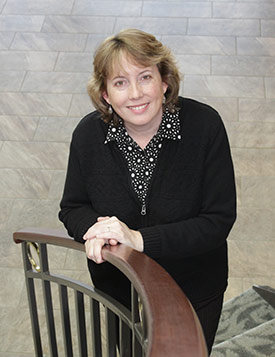Experts offer advice for managing remote practices, kids’ virtual schooling
By: Michaela Paukner, [email protected]//August 31, 2020//
Experts offer advice for managing remote practices, kids’ virtual schooling
By: Michaela Paukner, [email protected]//August 31, 2020//
 After a summer of working from home with kids around, many lawyer parents are striving to fit school time into their work schedules.
After a summer of working from home with kids around, many lawyer parents are striving to fit school time into their work schedules.
The Wisconsin Department of Public Instruction has left decisions about in-person and virtual learning to local school officials, calling on parents to plan for a variety of situations.
Mary Spranger, program manager for the State Bar of Wisconsin’s Lawyer Assistance Program, is preparing to have her two teenagers start remote learning on Sept. 8. An entirely virtual school day means her home will be both a full-time office and classroom.
“I’m thinking actively about how I’m going to manage that and what do I need to ask for from my employer to be able to be present for my family, be present for my clients and be present for myself,” Spranger said.
Since the pandemic’s beginnings, Spranger has been making use of a method known as “D3 Review.” This is meant to help people decide, at times when their obligations might seem overwhelming, what can be delayed, what can be delegated and what doesn’t need to be done.
“I remind myself every day (that) I’m not going to be able to check off the boxes for everything that everyone needs from me,” Spranger said. “I really want people to understand that they have permission not to do any of this perfectly right.”
Reframing expectations
Spranger and WisLAP, which provides stress management and mental health assistance to State Bar members, want to make sure legal practitioners are comfortable talking about the stress of working from home during a pandemic.
“Gradually, there’s been an expectation that we’ve gone back to business as usual, although it’s happening for many people in their homes,” Spranger said. “I am concerned that with this additional burden of schooling, something has to give.”
Some attorneys don’t realize the toll that stress, depression and anxiety can take on them, their families and their practices.
Spranger and Christopher Shattuck, manager of the State Bar’s Practice411 office management assistance program, have received a number of calls about practice-management matters that sometimes turn out to be mostly related to underlying trouble with mental health.
“Sometimes there are real neurological problems that are causing people to be less efficient and less productive than they’d like to be,” Spranger said. “I don’t want people to feel like they’re less than if they’re not managing to the top of their ability.”
Reframing expectations and asking for help when it’s needed can help reduce stress and make depression, anxiety and other mental health issues manageable.
Shattuck and Spranger recommend that people talk to their spouses, partners, kids and colleagues about what’s achievable in a day.
“From a practice-management standpoint, if you are in a position where you can rely on your spouse or your partner to help with some of those co-parenting activities, you (can) take turns during your day,” Shattuck said.
For single parents or those who aren’t able to share their responsibilities with others, Spranger said it may be time to turn to their colleagues and human resources departments to ask about a modified schedule.
“I’m encouraging people to think about work-life balance and work-life integration,” Spranger said. “There may need to be less of an emphasis on an eight-hour workday if the productivity remains the same, and bringing those kinds of solutions to an HR person might be a valid thing to do.”
Communicating availability
Elizabeth Reeths, an associate at Klinner Kramer Shull in Wausau, started working from home in March after she had received notice that her daughter’s daycare was closing.
She and her husband, who was also able to work from home, traded off watching their 16-month-old during work hours and tried to schedule calls and meetings during nap time.
“I found it very helpful to be able to tell people if you need to call me, call between these times,” Reeths said. “Being able to tell people when I was going to be available and when I was going to be working on things helped a lot in managing other people’s expectations.”
Fortunately, the daycare reopened in May and, after consulting a pediatrician, Reeths and her husband decided that sending their daughter back to daycare was the best option for the whole family.
“That’s a difficult decision to make,” Reeths said. “We both felt uncomfortable with it, but at the same time, recognized that it wasn’t going to be sustainable long term for us to work full time and also take care of a toddler full time.”
For parents who are still working from home with kids around, Reeths recommends talking to your colleagues throughout the day about your schedule.
“There were definitely times where I’d be on the phone with a client, and she’d be crying or needed attention,” Reeths said. “People were always very understanding of that. No one ever made me feel like I was wasting their time.”
Advocate for yourself

When talking to employers about expectations, attorneys should use their advocacy strengths to argue for an arrangement that will suit their needs, Spranger said. Speaking up may ultimately benefit colleagues, too.
“I think many more people are struggling then are perhaps letting on, and attorneys who are able to have those conversations have a special responsibility, in some ways, to bring these ideas to the forefront so it’s easier for other people to have those conversations,” Spranger said.
WisLAP provides a safe and confidential space for attorneys to talk about how to go about having a conversation with their supervisors. Practice411 can similarly be used by lawyers who may not have a human-resources department or similar resources to turn to.
“Just because you’re a solo practitioner or you’re in a small firm or you’re in a rural part of the state or you’re not even in this state, you are not alone in this process,” Shattuck said. “We can give you the resources, tools and help you get to where you want to be in the profession.”
Practice411 and WisLAP both have helplines that can be used for confidential referrals by attorneys who are worried about a colleague or friend. WisLAP’s 24-hour helpline can be reached at 800-543-2625. Help from Practice411 is available at [email protected] or 1-800-957-4670. More information is also available at wisbar.org.
Photo illustration by Kevin Harnack
Legal News
- Wisconsin joins Feds, dozens of states to hold airlines accountable for bad behavior
- Trump ahead of Biden in new Marquette poll
- Bankruptcy court approves Milwaukee Marriott Downtown ‘business as usual’ motion
- New Crime Gun Intelligence Center to launch in Chicago
- Arrest warrant proposed for Minocqua Brewing owner who filed Lawsuit against Town of Minocqua
- Wisconsin Supreme Court justices question how much power Legislature should have
- Reinhart named the 2024 Wisconsin law firm of the year by benchmark litigation
- Milwaukee’s Common Council now has the most African Americans, women and openly LGBTQ members ever
- Office of School Safety Provides Behavioral and Threat Assessment Management Training Ahead of 25th Anniversary of Columbine Shooting
- Wisconsin Supreme Court to hear arguments in Democratic governor’s suit against GOP-led Legislature
- Lawsuit asks Wisconsin Supreme Court to strike down governor’s 400-year veto
- Wisconsin man pleads not guilty to neglect in disappearance of boy
WLJ People
- Power 30 Personal Injury Attorneys – Russell Nicolet
- Power 30 Personal Injury Attorneys – Benjamin Nicolet
- Power 30 Personal Injury Attorneys – Dustin T. Woehl
- Power 30 Personal Injury Attorneys – Katherine Metzger
- Power 30 Personal Injury Attorneys – Joseph Ryan
- Power 30 Personal Injury Attorneys – James M. Ryan
- Power 30 Personal Injury Attorneys – Dana Wachs
- Power 30 Personal Injury Attorneys – Mark L. Thomsen
- Power 30 Personal Injury Attorneys – Matthew Lein
- Power 30 Personal Injury Attorneys – Jeffrey A. Pitman
- Power 30 Personal Injury Attorneys – William Pemberton
- Power 30 Personal Injury Attorneys – Howard S. Sicula











